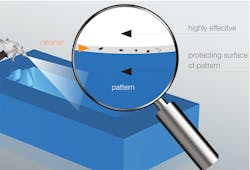Clean Tooling Improves Core and Mold Processes, Productivity
Q: Would you recommend a simple way to increase our foundry’s coremaking volume and productivity?
A: Product quality comes first, and keeping the tooling clean of residue is necessary to achieve quality core and mold products. Of course, using a high-efficiency release agent can prolong the time between necessary cleaning of coremaking and mold tooling, but a quick and easy way to extend machine uptime is by applying a fast and efficient metal cleaner to remove residual binder/sand build-up on that tooling. Not only will these metal cleaners ensure that the tooling is clean to provide the ideal surface for producing a core or mold, they also help keep vents clear and open so that core and/or mold production proceeds efficiently.
Tooling and vents that are free of debris will decrease the process downtime, thereby increasing the productivity overall. Keep in mind, metal cleaners are solvents formulated to dissolve binders. Always check the compatibility of the metal cleaner with the tooling material and any seals or plastic with which it may come into contact.
There are “environmentally friendly” or “green” metal cleaners being promoted and adopted by the metalcasting market, but typically these products do not work as completely and efficiently as more standard cleaner formulations. If handled properly, ASK’s metal cleaners are the most efficient and economical to use. ZIP CLEAN™ SUPREME breaks down cold-box resin in less than 15 minutes, in comparison to older cleaner formulation that may soften the resin, but never truly break it down so that it is removed without further steps.
Spraying or brushing the metal cleaner directly on the built-up areas and then allowing it to soak for at least 15 minutes is the most effective way to clean metal patterns. After the cleaner has been allowed to work, the softened films can then be removed easily and the patterns are ready to use again. Small parts may be immersed or soaked in the cleaner.
All this can be accomplished without removing the tooling from the core machine, saving additional downtime. Ideally all excess cleaner should be removed prior to re-commissioning the tooling for the production process.
Personal protective equipment is critically important when working with metal cleaners, as most are corrosive formulations and may cause irritation if mishandled. Operators should wear chemical-resistant gloves and goggles. A face shield also may be recommended to guard against fumes, splashing or other contact. In order to know for certain, it is critical to read the Safety Data Sheets (SDSs) carefully and understand the associated risks and precautions before using any metal cleaner.
Join the Conversation. Email Your Questions for ASK Chemicals
Share your insights or opinions, and elaborate on the experts’ answers. You must be logged in to the website to post your comments.

